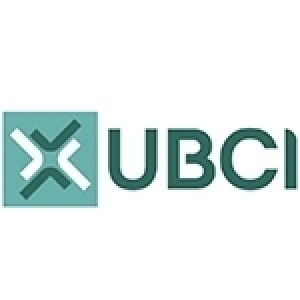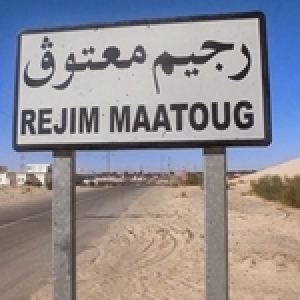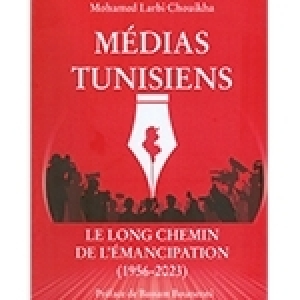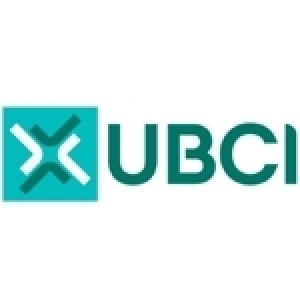IMF: Tunisia Weathers Crisis Well, But Unemployment Persists
Tunisia’s economy fared relatively well during the global crisis, but the country’s key challenge is to boost job-generating growth and lower unemployment, say IMF economists.
In its annual health check of Tunisia’s economy, the IMF said that growth is expected to reach 3.8 percent in 2010, after slowing to 3 percent in 2009 as the global downturn took its toll. But unemployment has begun to rise, after having fallen to 12.4 percent in 2007, and at 13.3 percent, remains relatively high, particularly among the educated youth.
“Tunisia’s growth could increase gradually and reach an average of about 5 percent over 2010-14, provided that policies and reforms planned by the authorities aimed at enhancing Tunisia’s competitiveness, developing new markets, and supporting new sources of growth in sectors with high added value bear fruit,” the IMF report said.
Slowdown in Europe poses risk
Over the past two decades, the North African nation has undertaken wide-ranging structural reforms aimed at enhancing its business environment and improving the competitiveness of its economy. These reforms, accompanied by prudent macroeconomic management, have reduced the Tunisian economy’s vulnerability to shocks—including the global financial crisis—and provided more options for the authorities to respond to them.
But with growth in Tunisia’s main trading partners projected at a mere 1.2 percent in 2010 and 1.5 percent in 2011, the country’s economic recovery remains on fragile footing. Moreover, downside risks to prospects for recovery in Europe—by far Tunisia’s largest partner in terms of exports, tourism receipts, workers’ remittances, and foreign direct investment—have risen significantly in recent months, posing risks to the country’s short-term outlook, the IMF assessment found.
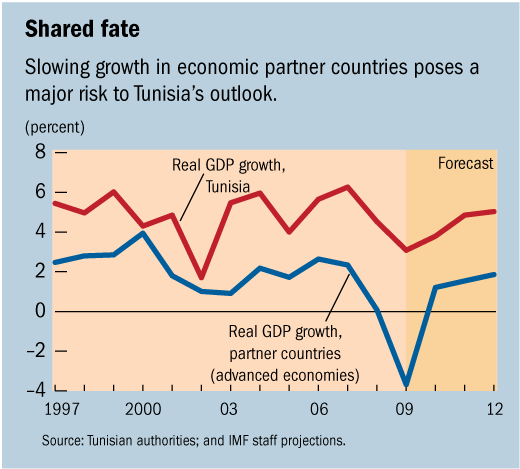
Thanks to prudent macroeconomic management, Tunisia still has some leeway to deal with such potential external risks, particularly on the fiscal policy front. But the authorities will need to remain vigilant in the face of potential inflationary pressures, a recent deterioration of the current account balance, and declining external reserves.
Medium-term challenges
To achieve Tunisia’s medium-term objectives of boosting employment-generating growth and lowering unemployment, the authorities are developing an export promotion strategy that seeks to diversify target markets and products. To that end, they have signed a preferential trade agreement with the West African Economic and Monetary Union and are currently negotiating free trade agreements with the Central African Economic and Monetary Community. Bilateral negotiations with the European Union are also under way to extend the Association agreement to services, agricultural products, and processed food; the agreement currently provides for free trade for industrial products.
The authorities have also identified a number of reforms to labor market policies, the educational system, and public employment services that will serve to facilitate labor mobility and reduce mismatches between demand and supply in the labor market. The implementation of these reforms will be supported by several World Bank Development Policy Loans.
Strengthening resilience
Maintaining a stable macroeconomic environment that promotes employment and growth also requires determined expenditure control, the IMF assessment said. Key for success in this area is the reform of the social security system. To this end, the authorities are in discussion with social partners on pension reforms to buttress the pension system’s financial sustainability. The government should also explore ways to contain subsidies of food and fuel products, the report noted.
The authorities are also undertaking reforms to make the tax regime more business friendly. International comparisons with other emerging market economies show that the tax burden on businesses is relatively high in Tunisia and that there is scope to increase the yield from consumption taxes. To promote private investment and employment, the authorities intend to reduce tax rates on businesses and to offset those reductions by increasing the standard VAT rate and expanding the tax base through the elimination of exemptions, the report noted.
Tunisia’s growth-enhancing strategy also includes a package of measures to strengthen the financial sector through consolidating the financial strength of banks, enhancing the role of banks in the economy, restructuring the public banking system, and bolstering the presence of Tunisian banks abroad. The aim, ultimately, is to transform Tunisia into a banking services hub and a regional financial market.
To strengthen the country’s ability to adapt to changes in the global economic environment, the authorities also intend to modernize the monetary policy framework by introducing inflation targeting and to implement convertibility of the dinar and capital account liberalization by 2014. The IMF assessment said that this strategy would require significant preparatory work, particularly further strengthening of the banking system and deepening of the foreign exchange, money, and capital markets. The report also noted that the authorities would need to take additional steps to ensure increased reliance on interest rates as the operational target of monetary policy.
IMF
By Joël Toujas-Bernate and Rina Bhattacharya
IMF Middle East and Central Asia Department
September 10, 2010
- Ecrire un commentaire
- Commenter

Cette analyse et presentation des faits par le IMF me semble plus pertinente (utile) que le classement de Davos (car etre mieux classes que l'Espagne ou la Turquie me semble un peu surprenant). Ainsi sont identifies les risques et les axes sur lesquels la Tunisie doit travailler. Il serait interessant d'observer la convertibilite totale du Dinar (2014) et le jeu de pendule entre la TVA (qui devrait augmenter) et les taxes sur l'Entreprise (qui devraient diminuer). Une chose est certaine, ne rien faire serait terrible. Alors essayons et croisons les doigts en retroussant les manches. Humblement Votre

Evaluation of Tunisia's economic performance is based on universal criteria,and lessons are to be drawn from past fiveyear plans so as to better predict the future.Goals set need be realistic,achievable, precise,coherent,and hierarchical,to use Philip Kotler'scaracteristics of sound managerial goals.The four factors of success remain, Infrastrucutre,Institutions,Incentives and Innovations.Drawing lessons from the past ,as far as 1989,following the adoption of many,and not all the proposals made by the International Monetary Fund and the World Bank in their joint assessment of the strenghts ans weaknesses noted,then,and their delineation of Up-grading,known as Mise à Niveau. Such a process is a lengthy one and requires for all aout effort on various fronts,financial,economic,technologica,institutional,legal,social and ecological.A reorientation of policy is to be based on past experience and the new challenges ahead.All in all,efficiency and effectiveness will remain the deciding criteria,in whatever feasible projects are to be chosen and implemented.As Michael E Porter,an eminent specialist in Strategy and Management,declared in many an occasion,Strategy is the Art of knowing what not to do.

